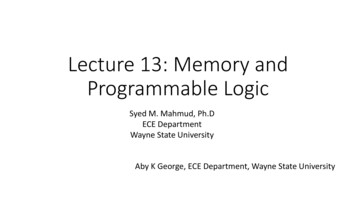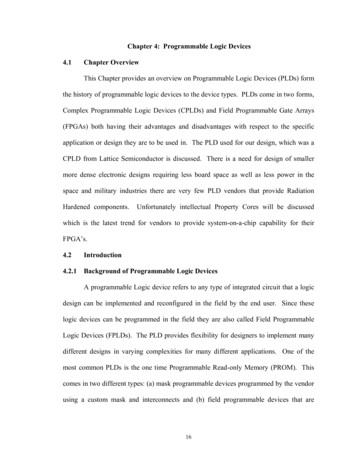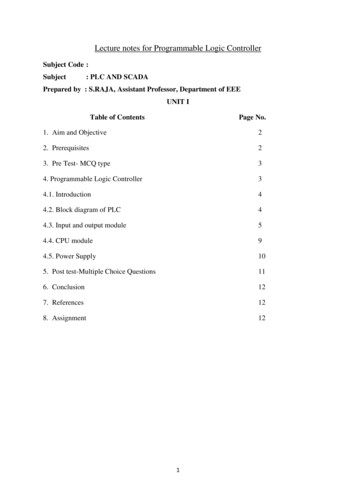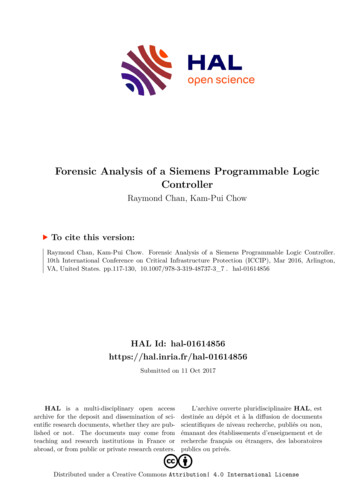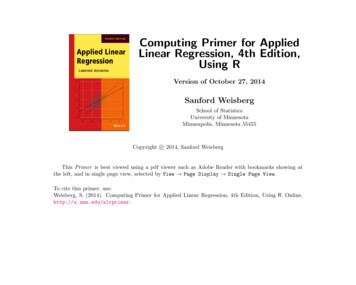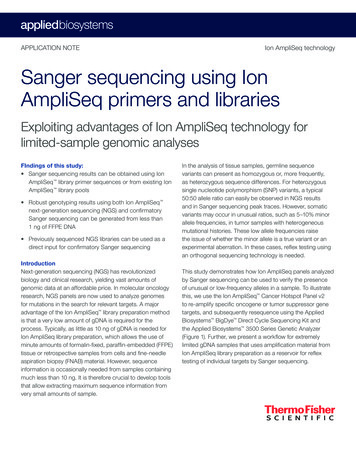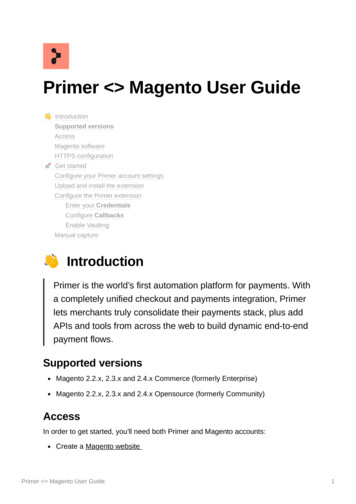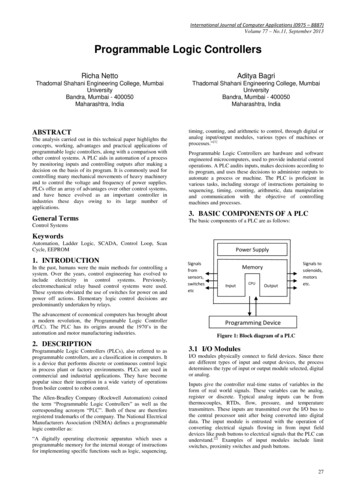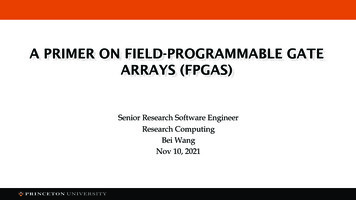
Transcription
A PRIMER ON FIELD-PROGRAMMABLE GATEARRAYS (FPGAS)Senior Research Software EngineerResearch ComputingBei WangNov 10, 2021
Outline Introduction to FPGAs MotivationArchitectureProgramming FPGAIntel FPGA SDK for OpenCL FPGA nodes at Princeton Research Della-fpga Workflow of running an OpenCL application at della-fpga nodes Insights: adoption FPGAs for HPC
Moore’s LawPost Moore f-microprocessor-trend-data/,John Shalf, Digital Computing Beyond Moore’s Law, Supercomputing Frontiers,Singapore 2017
Why FPGA for HPC Architectural specialization is one option tocontinue to improve performance beyond the limitsimposed by the slow down in Moore’s law Using application-specific hardware allows moreefficient use of the hardware, both in terms ofpower usage and performance
Mapping Computation on FPGAsCPU instructionsHigh-level codeMem[100] 42 * Mem[101]R0 Load Mem[100]R1 Load Mem[101]R2 Load #42R2 Mul R1, R2R0 Add R2, R0Store R0 Mem[100]OpenCL for FPGAs, Dmitry Denisenko, Intel Programmable Solution Group
CPU Architecture General architecture with data paths covering all cases Fixed data width Fixed operations
CPU Activities over TimeOpenCL for FPGAs, Dmitry Denisenko, Intel Programmable Solution Group
FPGA Activities over Space and Specialize 1. Unroll the CPU hardware in space2. Remove instruction “Fetch” sinceinstructions are fixed3. Remove unused ALU ops4. Remove unused Load/Store unitsOpenCL for FPGAs, Dmitry Denisenko, Intel Programmable Solution Group
Further specialization4. Wire up registers properly5. Remove dead data6. RescheduleOpenCL for FPGAs, Dmitry Denisenko, Intel Programmable Solution Group
Custom Data-path on FPGA
FPGA ArchitectureIntel FPGA Technical Training: Optimizing OpenCL for Intel FPGAs
FPGA for HPC Roadblocks Traditionally programmed using Hardware Description Language (HDL) mainly Verilogand VHDL Had limited computational capabilities Radical changes in recent years OpenCL has been adopted two major FPGA vendors, Altera (now Intel) and Xilinx Intel introduced new Arria 10 FPGA family, which for the first time in the history ofFPGAs, included DSPs with native support for floating point operations FPGAs are still behind GPUs in terms of both compute performance andexternal memory bandwidth Peak performance (sp)Memory bandwidthPower efficiencyArria 10 GX 1150 FPGA1450 GFLOP/s34.1 GB/s70 WattsNVIDIA GTX 980 Ti GPU6900 GFLOP/s336.6 GB/s275 WattsRef: Hamid Reza Zohouri, High Performance Computing with OpenCL, Ph.D. thesis, 2018
Programming FPGA Hardware description languages (HDL) such as VHDL or Verilog Used by hardware designers only Describe the behavior of the algorithm to crease low level digital circuit Take several months to even years High level synthesis (HLS) Makes FPGA usable by software programmers Design at a higher level of abstract by leveraging GNU compatible HLS compiler OpenCL Design with C/C based software language Makes FPGA acceleration available to software developers Open standard for heterogeneous computing OneAPI Based on data parallel C (DPC ) programming language and runtime Consists of a set of C classes, templates and libraries to express a DPC program Develop a clean, modern C based application w/o most of the setup associated with OpenCLcode
Intel FPGA SDK for OpenCLIntel FPGA Technical Training: Optimizing OpenCL for Intel FPGAs
Kernel Development Flow and ToolsIntel FPGA Technical Training: Optimizing OpenCL for Intel FPGAs
SDK Components Offline Compiler (AOC) Translates OpenCL kernel source code into an Intel FPGA hardware configuration file Host Libraries Provide OpenCL host and runtime API for host application AOCL Utility Performs various tasks related to board, drivers, and compile source Software Requirements Intel Quartus Prime software, plus license Intel FPGA SDK for OpenCL, plus license C compiler for the host program
Offline Compiler (AOC) OptionsOptionDescription--list-boardsPrints a list of available boards--boardCompile for the specific board-march emulatorCreate kernels that can be execute and debugged on the host x86 w/o the board-gAdd debug data to reports-rtlCompile and link the kernel or object files w/o the board;Generate compiler optimization report--reportPrint out area estimates to screen--profileEnable profile support when generating aocx file--help or -hHelp for the tool
AOCL UtilitiesHost Compilation Commandsaocl compile-configDisplays the compiler flags for compiling your host programaocl link-configShows the link options needed by the host program to link with librariesaocl makefileShows example makefile to compile and link a host programBoard Management Commandsaocl diagnoseRuns the diagnose test programaocl programProgram the FPGA using the provided aocx fileOthersaocl reportDisplays kernel execution profiler dataaocl envDisplays how the aocx file was compiledUse “aocl help” for all commands
Intel FPGAs AvailablePrinceton Research Computing
FPGAs in Research Computing Princeton research computing recently installed four FPGAs on the Della cluster They can be accessed through: ssh –l netid della-fpga1.princeton.edu or ssh –l netid della-fpga2.princeton.edu Temporary account is created on della-fpga2 for you. The account will be valid till the end of thisweek Each node has two FPGAs There is NO scheduler system installed in these two FPGA nodes
Using OpenCL in Della Set up OpenCL environment in della-fpga1 and della-fpga2 source /opt/intel/fpga-d5005/inteldevstack/init env ocl 20.1.sh Compile on emulation mode on x86 (debugging) aoc –march emulator kernel name.cl (option –legacy-emulator is required for compiling using 19.2OpenCL SDK) Set CL CONFIG CPU EMULATE DEVICES number of devices if using more than 1 devices Compile and link w/o building hardware (generating *.aocr file and html report) aoc –rtl kernel name.cl –report Full deployment (generating *.aocx file) aoc kernel name.cl
Special Setup for Running Emulation Mode at Della-fpga The emulator in SDK is built with GCC 7.2.0 and so the libstdc .so linked to the host haveto be at least as new as provided in GCC 7.2.0 which is libstdc .so.6.0.24 The devtoolkit provided at RHEL 7 system at della-fpga does not provide the requiredlibstdc version Fortunately, anaconda carries libstdc .so.6.0.26 which is from GCC 9.1.0 To link to that library, we need to run the host as:env LD LIBRARY PATH /usr/licensed/anaconda3/2020.7/lib: LD LIBRARY PATH./host
My .bashrc at della-fpga
Profiling To instrument the OpenCL kernelpipeline with performance counters,include –profile option of the aoccommand when compiling the kernel The counter information is saved in aprofile.mon monitor description fileand can be converted into a readableprofile.json file aocl profile ./host -x kernel filename.aocx–s kernel filename.source Use the Intel FPGA Dynamic Profilerfor OpenCL report utility command tolaunch the profiler GUI aocl report kernel filename.aocxprofile.mon kernel filename.source Alternatively use Intel VTune Profilerto open the profile.json file
Live Demo
Insights: adoption FPGAs in HPC The main source of performance bottleneck in current-generation FPGAs is externalmemory bandwidth.DevicePeak Perf (GFLOP/s)Peak Bandwidth (GB/s)TDP (Watt) YearTesla V10015,7008973002017Stratix 10 GX8,64076.82002018 A big portion of HPC applications rely on double-precision (or even higher)computation which cannot be efficiently realized on current FPGAs Placement and routing time on FPGAs is a major limiting factor in performanceevaluation of these devices Lack of libraries and open-source projects significantly hinder the ability of a large partof the community in adopting FPGAsHamid Reza Zohouri, High Performance Computing with OpenCL, Ph.D. thesis, 2018
References Intel FPGA SDK for OpenCL Pro Edition: Getting Started GuideIntel FPGA SDK for OpenCL Pro Edition: Programming GuideIntel FPGA SDK for OpenCL Pro Edition: Best Practices GuideFree Intel FPGA OpenCL online training Introduction to OpenCL for Intel FPGAs Optimizing OpenCL for Intel FPGAs OpenCL for FPGAs, Emitry Denisenko, High-Level Design Team, IntelProgrammable Solutions Group High Performance Computing with FPGAs and OpenCL, Hamid RezaZohouri, Ph.D., Thesis, Tokyo Institute of Technology
FPGA Pipeline Parallelism An example: (𝑎! x 𝑏! x 𝑐! ) 𝑑!Non-pipelined DesignPipelined rticles/why-how-pipelining-in-fpga/
The main source of performance bottleneck in current-generation FPGAs is external memory bandwidth. A big portion of HPC applications rely on double-precision (or even higher) computation which cannot be efficiently realized on current FPGAs Placement and routing time on FPGAs is a major limiting factor in performance
